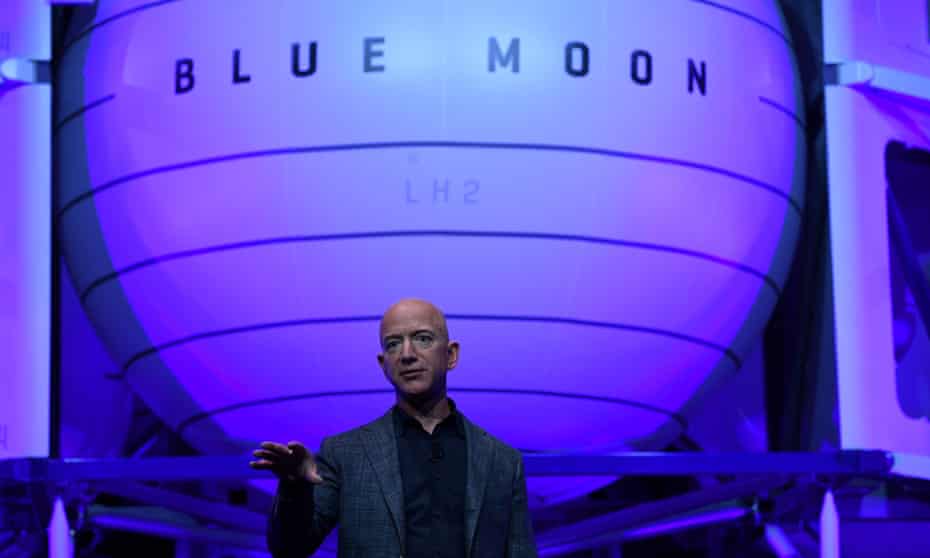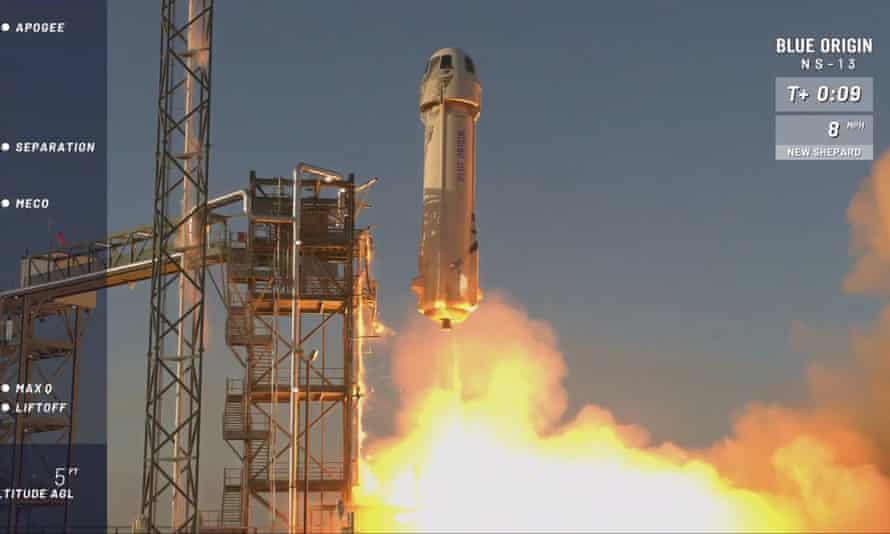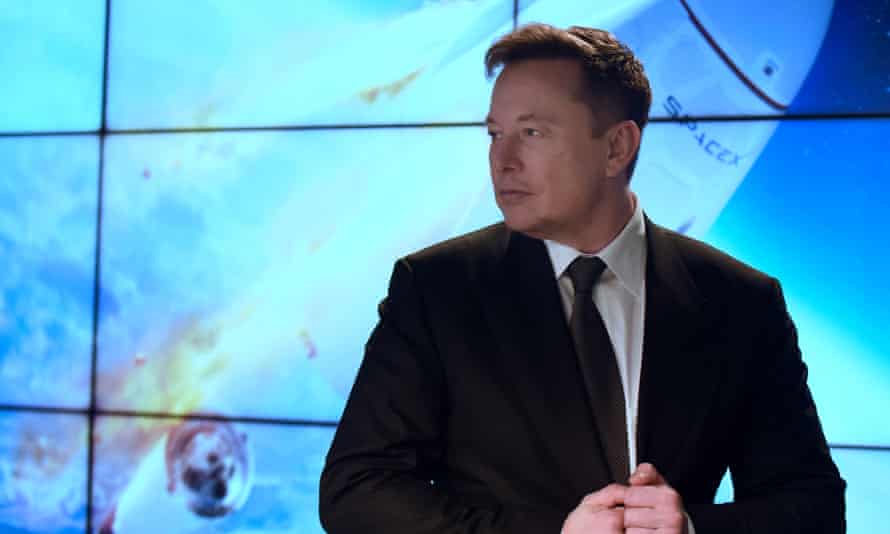
Jeff Bezos unveils Blue Origin’s space exploration moon lander in Washington. Photograph: Clodagh Kilcoyne/Reuters
Jasper Jolly
@jjpjolly
Sat 6 Feb 2021
Later this year Jeff Bezos, the first person to have led a business from nothing to a trillion-dollar valuation, will step down from his job as head of Amazon. But as you’d expect from a tech multibillionaire, his eyes are on a potentially bigger prize: outer space. Bezos will be dedicating more time to a space race between entrepreneur rivals that hopes to push the frontiers of society – and commerce – beyond planet Earth.
Having completed its 14th mission last month – successfully carrying a dummy, “Mannequin Skywalker”, into space – Bezos’s space company, Blue Origin, believes relatively cheap travel for humans is not far off. That would finally deliver a return on the $1bn (£730m) of Amazon stock Bezos has to sell annually to fund it. Blue Origin was one of four projects flagged by the Amazon boss as likely recipients of his attention now, alongside the Washington Post newspaper, his Day One charitable fund and the environmental Earth Fund.
“I’ve never had more energy, and this isn’t about retiring. I’m super passionate about the impact I think these organisations can have,” said Bezos, who is becoming executive chairman at Amazon.
But competition in the stratosphere will be as tough as in retail. Rival billionaire Elon Musk’s SpaceX is arguably ahead of Blue Origin. Despite an uncrewed test flight last week ending in a fiery crash, SpaceX is already able to reuse its Falcon 9 rockets. Musk (no stranger to making and sometimes breaking bold promises) aims to fly to Mars as soon as 2024.
Jasper Jolly
@jjpjolly
Sat 6 Feb 2021
Later this year Jeff Bezos, the first person to have led a business from nothing to a trillion-dollar valuation, will step down from his job as head of Amazon. But as you’d expect from a tech multibillionaire, his eyes are on a potentially bigger prize: outer space. Bezos will be dedicating more time to a space race between entrepreneur rivals that hopes to push the frontiers of society – and commerce – beyond planet Earth.
Having completed its 14th mission last month – successfully carrying a dummy, “Mannequin Skywalker”, into space – Bezos’s space company, Blue Origin, believes relatively cheap travel for humans is not far off. That would finally deliver a return on the $1bn (£730m) of Amazon stock Bezos has to sell annually to fund it. Blue Origin was one of four projects flagged by the Amazon boss as likely recipients of his attention now, alongside the Washington Post newspaper, his Day One charitable fund and the environmental Earth Fund.
“I’ve never had more energy, and this isn’t about retiring. I’m super passionate about the impact I think these organisations can have,” said Bezos, who is becoming executive chairman at Amazon.
But competition in the stratosphere will be as tough as in retail. Rival billionaire Elon Musk’s SpaceX is arguably ahead of Blue Origin. Despite an uncrewed test flight last week ending in a fiery crash, SpaceX is already able to reuse its Falcon 9 rockets. Musk (no stranger to making and sometimes breaking bold promises) aims to fly to Mars as soon as 2024.
01:44 'Gotta work on that landing': SpaceX rocket fails again – video
There had already been a private-sector revolution in the space industry, as US government enthusiasm for huge spending waned. Commercial companies now account for about 80% of the $424bn global space industry, according to Professor Loizos Heracleous of Warwick Business School, who has written extensively on the business of space
Most of the industry is focused on IT, but experts believe the billionaires’ efforts are about to usher in a new era, with the start of space tourism, manufacturing and more. Google co-founder Larry Page has backed Planetary Resources, a startup hoping to mine asteroids.
It will be overdue in the eyes of many. Sir Richard Branson predicted that Virgin Galactic, the space tourism company he founded, would first fly in space in 2009. Nonetheless, despite false starts and a fatal crash in 2014, analysts at UBS say Virgin Galactic will in 2021 offer “the only way for consumers to gain entry into the [roughly] 560-member astronaut club in the next five years”.
Cheaper technology – such as “cubesats” the size of a loaf of bread – mean more players can turn their eyes skywards. A global wave of investors looking for returns has loosed a wave of easy money, much of it through special purpose acquisition companies (Spacs) – “blank-cheque” vehicles that raise money on stock exchanges before boldly going to look for investments.

A Blue Origin rocket lifts off from its launchpad in Texas. Photograph: AP
Spacs have made some investors nervous about too-easy money, but they are delivering funding. Astra, a California-based rocket company founded by a former Nasa chief technology officer, last week announced it would use a merger with a Spac to list on the Nasdaq exchange, with a valuation of $2.1bn. Momentus, a company aiming for “last-mile” transportation in space, announced last October that it, too, would take the Spac route, for a billion-dollar valuation.
The total space industry could grow by $1tn in the next decade, according to Ron Epstein, aerospace analyst at Bank of America Merrill Lynch. He sees a turning point as technology improvements and capital combine, making space tourism and in-space manufacturing – of space stations, or even pharmaceuticals – increasingly viable. Deep-pocketed investors were playing a role similar to that of predecessors who had helped aerospace grow into a global industry, he said.
Spacs have made some investors nervous about too-easy money, but they are delivering funding. Astra, a California-based rocket company founded by a former Nasa chief technology officer, last week announced it would use a merger with a Spac to list on the Nasdaq exchange, with a valuation of $2.1bn. Momentus, a company aiming for “last-mile” transportation in space, announced last October that it, too, would take the Spac route, for a billion-dollar valuation.
The total space industry could grow by $1tn in the next decade, according to Ron Epstein, aerospace analyst at Bank of America Merrill Lynch. He sees a turning point as technology improvements and capital combine, making space tourism and in-space manufacturing – of space stations, or even pharmaceuticals – increasingly viable. Deep-pocketed investors were playing a role similar to that of predecessors who had helped aerospace grow into a global industry, he said.
Space-faring is risky and unpredictable, but that is the price for pushing the frontiers of technology – and humanityProfessor Loizos Heracleous
Heracleous agreed: “Accidents for SpaceX and other commercial players show that space-faring is unpredictable and dangerous. But this is the price for solving challenges and pushing the frontiers of technology and, ultimately, humanity.”
However, it is still an inherently risky business. Alok Sharma, the then business secretary, last year had to override written warnings from his top civil servant that the UK government could lose everything when it invested £400m in OneWeb, a bankrupt but potentially promising satellite company.
Governments are still involved. A mission to land the first woman on the moon by 2024 appears to be one of Donald Trump’s few legacies. Joe Biden’s administration said last week that it would continue the programme.
SpaceX and Blue Origin are already working on moon-lander designs under contracts awarded last year by Nasa for almost $1bn, alongside Dynetics, a subsidiary of defence contractor Leidos. Those contracts covered only 10 months of work: Nasa is due to evaluate each company’s efforts this month, before a test mission with just one of them.
Taking people to the moon and beyond is a key part of both Musk’s and Bezos’s visions, which can verge on the apocalyptic. Bezos talked in 2019 of a trillion humans populating the solar system, far beyond the resources of Earth; Musk has made clear his belief that a Mars colony could save humanity. That view is heavily criticised by some environmentalists, who argue we should focus on respecting the bounds of the planet we already inhabit.
Yet the hope for the space industry is that, by lowering the cost of space access, this billionaire race may have as-yet-unknown benefits for the world, even as the existential threat from the climate crisis looms.
Jim Cantrell, who worked with Musk at SpaceX in its early days, sourcing rockets, said the company’s success had made it easier for other space projects to get off the ground. These include his latest company, Phantom Space, which aims to drive down launch costs by mass-producing small rockets.
Cantrell said cheaper access to space had started something like the “New World economy” that followed the discovery of America: “It’s just beyond imagination how big it is.”

Elon Musk says colonising Mars could be humanity’s saviour.
Photograph: Getty Images
Space cadets
Jeff Bezos
Blue Origin will be one of Bezos’s priorities in life beyond Amazon, alongside the Washington Post newspaper and his charities.
Sir Richard Branson
Virgin Galactic could have paying passengers in space this year. An early focus on space tourism could eventually give way to supersonic travel using similar technology.
Elon Musk
Musk’s shareholding in Tesla meant he overtook Bezos as the world’s richest man this year. His schedule also includes Neuralink, a brain-to-computer interface, alongside SpaceX’s Mars ambitions.
Larry Page
The Google co-founder has backed Planetary Resources, an asteroid mining company, although analysts believe successful resource extraction could be decades away.
Marc Benioff
The Salesforce founder was a backer of Astra, a rocket startup that will raise as much as $500m through a merger with a special purpose acquisition company.
Mark Zuckerberg
The Facebook founder has expressed ambivalence about space tourism, but he did back Breakthrough Starshot, a project to send out small laser-powered “lightsail” spacecraft to collect imagery and scientific data.

No comments:
Post a Comment